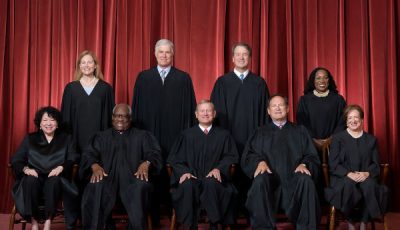Section 230 Faces New and Continuing Challenges
 WASHINGTON — The U.S. Court of Appeals for the 5th Circuit recently upheld a controversial social media law mandating that social media platforms and influential technology companies refrain from discriminating against right-wing political viewpoints.
WASHINGTON — The U.S. Court of Appeals for the 5th Circuit recently upheld a controversial social media law mandating that social media platforms and influential technology companies refrain from discriminating against right-wing political viewpoints.
“Today we reject the idea that corporations have a freewheeling First Amendment right to censor what people say,” said the judges. Trump-appointed Judge Andrew Stephen Oldham said the law “does not chill speech; if anything, it chills censorship.”
Tech companies argued the law, House Bill (HB) 20, is unconstitutional and violates the First Amendment right of the platforms not to host forms of speech that they deem objectionable and/or that violates their terms of use and conditions.
HB 20 is a state-level challenge to the supremacy of federal Section 230 of the Communications Decency Act. Section 230 is viewed as the “First Amendment of the internet” and is responsible for the proliferation of content and the innovation of platforms on the web. Right-wing users have frequently criticized social media platforms and search engines for purposefully suppressing content that doesn’t necessarily mesh with the corporate culture of the employees of the tech companies.
In Texas, lawmakers behind HB 20 alleged a systematic bias against conservative political voices and passed the new law despite there being very little evidence to even suggest a systemic bias against conservative voices on the part of social media platforms. HB 20 and other laws like it intend to hold social media companies to account for suppressing speech. The law gives users a basis for filing legal action against major platforms when users believe their speech has been suppressed
In a similar case, the state of Florida has filed a brief asking for the U.S. Supreme Court to review of a decision of the 11th Circuit Court of Appeals that struck down a similar law, deeming it unconstitutional. The Communications and Computer Industry Association, one of the industry groups representing major tech companies, announced its support for Supreme Court review while reiterating that they oppose the Florida law.
“Although we oppose legislation like Florida’s social media law, which threatens the First Amendment and democratic principles, [we agree] that the Supreme Court should resolve issues in this case,” Matt Schruers, president of the association, said in a press release issued last week.
It is likely the Supreme Court will review the Florida case and hand down a decision that impacts the Texas social media law. Which way the decision will go is difficult to predict. After the delivery of the unpopular decision that overturned Roe v. Wade, the conservative majority of the court could buck decades of case law and jurisprudence that links Section 230 to the First Amendment and uphold the law. Notably, Justice Clarence Thomas is an outspoken critic of Section 230 and has repeatedly asked for further review and amendment of the law.
In Congress, another attempt to gut Section 230 is a bill that proposes a regulatory agency to oversee social media and large technology companies. An analysis by Tony Samp and Danny Toney of the law firm DLA Piper notes that Sen. Lindsey Graham, R-S.C., is working on a proposal that would create a “regulatory environment with teeth” to regulate and perhaps license social media and tech companies.
Graham said that he’s coordinating with Sen. Elizabeth Warren, D-Mass., to “create a process to regulate the tech sector.” Sen. Josh Hawley, R-Mo., has said he is involved with the proposal, as well. “Elizabeth and I have come to believe that it’s now time to look at social media platforms anew,” Graham said during a recent hearing.
Graham stressed bipartisanship, pointing to the coordination between his office and Warren’s. Aides for both senior senators say there is coordination but no agreement is yet final. The measure may also gain support from the White House.
Earlier this month, at a “listening session” that included a select group of private sector tech executives, President Joe Biden made clear his administration’s desire to reform Section 230. The Center for American Progress observed the White House would like to reform the law in a way that is appealingly bipartisan. The White House’s framing echoed a House Republican pledge to “scrap Section230 for the largest tech companies,” notes the think tank.
Capitol building image by Kendall Hoopes from Pexels













